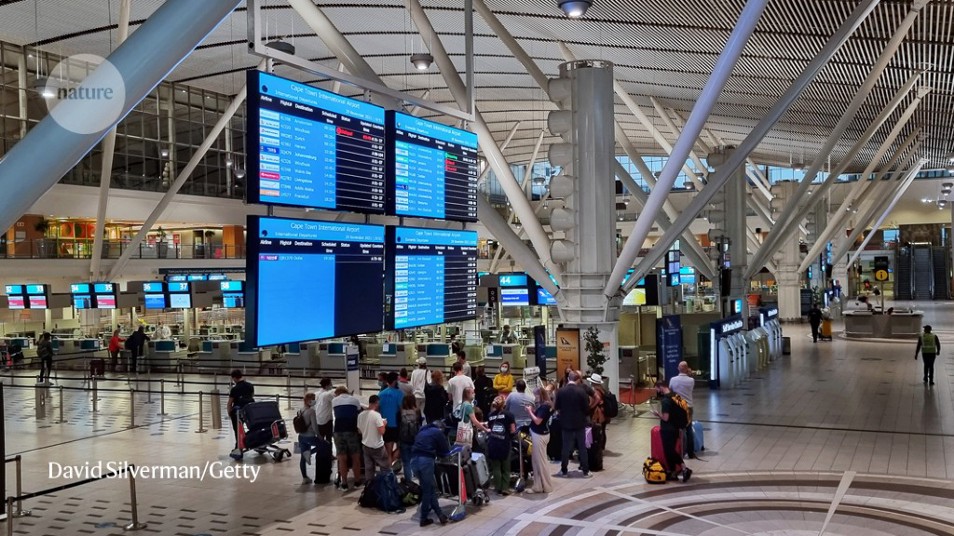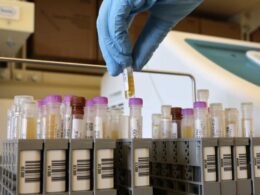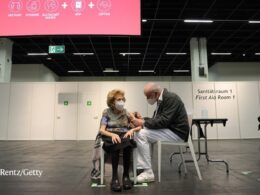Nature
Smriti Mallapaty
December 2, 2021
More than 50 countries have stepped up border controls to slow the spread of Omicron, a highly mutated SARS-CoV-2 variant of concern that is sweeping through South Africa.
But researchers say many of the restrictions — especially those targeting only travellers from a handful of countries — are unlikely to keep Omicron out, and come at significant cost to the countries concerned.
Scientists in some of the affected countries also say that travel bans risk slowing down urgent research on Omicron, by limiting the arrival of imported lab supplies.
“I’m not that optimistic that the way in which these measures are being rolled out right now will have an impact,” says Karen Grépin, a health economist at the University of Hong Kong, who studies border-control measures.
“It’s too late. The variant is circulating globally,” agrees Kelley Lee, who studies global health at Simon Fraser University in Burnaby, Canada.
Dangerous deterrent
Most travel bans target South Africa, which raised the alarm about Omicron on 24 November, and Botswana, which also reported early cases. Many nations are also banning visitors from neighbouring Lesotho, Eswatini, Zimbabwe and Namibia.
In South Africa’s most populous province, Gauteng, Omicron accounts for the majority of virus samples sequenced in the past few weeks. The World Health Organization (WHO) has designated Omicron a variant of concern because it has numerous mutations in its spike protein, some of which could make it more infectious or improve its ability to evade antibodies.
The extent of travel restrictions varies. The United States is preventing only non-US citizens who have been in selected countries from entering; Australia is also requiring 14 days of quarantine for its own citizens and residents who have visited those countries in the past two weeks.
Researchers say border restrictions might deter nations from alerting the world to future variants. They will also slow down urgent research, because few planes carrying cargo — including lab supplies needed for sequencing — are now arriving in South Africa. Researchers are racing to understand how Omicron’s transmissibility and ability to evade immunity created by vaccines differ from those of pre-existing variants of SARS CoV-2. They’re also investigating the relative severity of the illness Omicron causes.
“The travel ban will paradoxically affect the speed at which scientists are able to investigate,” says Shabir Madhi, a vaccinologist at the University of the Witwatersrand in Johannesburg, South Africa. Researchers might also struggle to share samples with global collaborators.
Threat to genomic surveillance
Tulio de Oliveira, a bioinformatician at the University of KwaZulu-Natal in Durban, South Africa, says the slashing of commercial flights could threaten crucial genomic surveillance efforts by a network of institutions in the country. “By next week, if nothing changes, we will run out of sequencing reagents,” he says.
Earlier this week, in response to the border restrictions, the WHO published guidance that recommended against travel bans to control viral spread. The advice includes specific recommendations for measures that would be useful, including quarantining new arrivals, and testing travellers for SARS-CoV-2 before and after they make their journeys.
The WHO guidance represents a clear shift in researchers’ understanding of the effectiveness of travel restrictions over the course of the pandemic. Before COVID-19, scattered data led many public-health agencies to denounce border restrictions — although almost every country imposed them in early 2020 anyway. But the pandemic has revealed that restrictions can be useful in certain contexts, especially for relatively geographically isolated nations such as Australia and New Zealand.
However, more rigorous studies are needed to flesh out when and how restrictions work best, in particular for countries with more porous borders, says Steven Hoffman, an international lawyer and epidemiologist at York University in Toronto, Canada.
Buying time
One clear lesson has been that restrictions are most effective when they are implemented rapidly, but the Omicron-related border closures were too late, says Grépin.
The variant has now been detected on every populated continent and in more than 20 countries and territories, including the Netherlands, the United Kingdom, Australia and Japan. Some nations acquired the infection even before South Africa reported the variant to the WHO. “As soon as countries start looking for it, they’re finding it, so the advantage of time is probably gone,” says Grépin.
Restrictions are also probably most effective at slowing the number of initial cases in a country when they reduce the total volume of international arrivals, rather than when they pick and choose specific countries, says Lee.
For example, one modelling study from the Canadian province of Newfoundland and Labrador, which closed its borders to non-residents on 4 May 2020, found that the restrictions helped to reduce the average number of COVID-19 cases by 92% in the 9 weeks after they were imposed.
For border-control measures to be effective, they also need to be comprehensive, including regular testing and at least a week of quarantine,for those travellers who do arrive, says Catherine Worsnop, who studies international cooperation during global health emergencies at the University of Maryland in College Park. But this, she says, is something “most countries have not done”.
Border-control measures should be used alongside efforts to strengthen public-health interventions such as social distancing, mask wearing and vaccination, says Grépin, because genomic studies have shown that cases will eventually slip through.
Ultimately, travel restrictions are intended to buy countries time to prepare their health systems for Omicron’s potential impact. But unless they implement domestic measures, it’s hard to know what “we’re buying time for”, adds Worsnop.
References
See the original publication
About the author
Smriti Mallapaty, Senior Reporter, Sydney
Smriti joined Nature in 2020, and covers the Asia-Pacific region. She previously worked as an editor at the Nature Index, and has also worked as a freelance journalist reporting on science and environment based out of Kathmandu, Nepal. She has a master of science degree in environmental technology from Imperial College London.
Originally published at https://www.nature.com.
Names cited
Karen Grépin, a health economist at the University of Hong Kong, who studies border-control measures.
Kelley Lee, who studies global health at Simon Fraser University in Burnaby, Canada.
Shabir Madhi, a vaccinologist at the University of the Witwatersrand in Johannesburg, South Africa.
Steven Hoffman, an international lawyer and epidemiologist at York University in Toronto, Canada.












